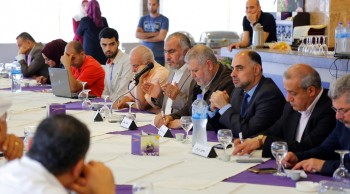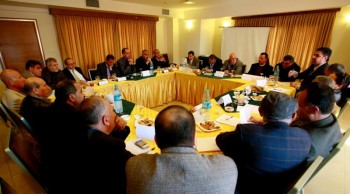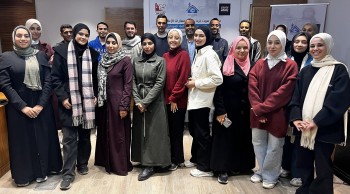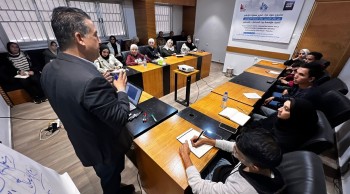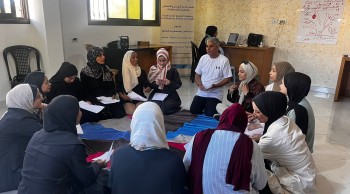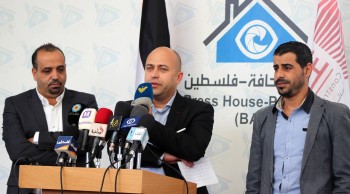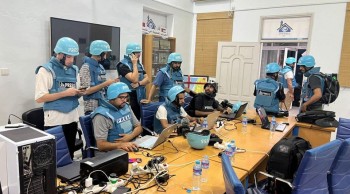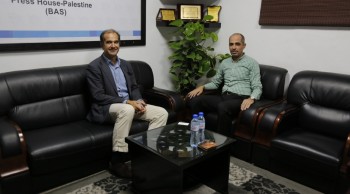Gaza-Tues Jan 21 --- Sponsored by Press House-Palestine, youth journalists team organized a meeting with the Palestinian factions’ representatives to discuss the latest political developments in Palestine.
Factions’ representatives agreed on the necessity of achieving reconciliation and ending the political division to face the challenges that threaten the future of the Palestinian case.
Tens of Palestinian media outlets’ representatives along with new journalists, media graduates and students participated in the meeting; to enhance the networking and communication between journalism colleges and journalists working in the field in a first of a kind meeting.
Faiez Abu-Eita, the official spokesman of Fateh, said: “Palestinian leadership and Fateh are committed to the national constants, stressing their resistance against the pressure exerted by the Israeli occupation and the United States.”
Abu-Eita explained that the Palestinian leadership returned to the negotiations with an American commitment and a new political attitude that compels Israel with peace requirements.
He also clarified that Mahmoud Abbas’ assent to return to negotiations was to give the United States and the international community the opportunity to reach a result, noting that the latter had known the reality of Israel.
Hany El-Thawabta, a member of the central committee of PFLP, stressed the importance of ending the Palestinian division and achieving reconciliation; noting that the Palestinian community is in urgent need to restore unity and national reconciliation.
El-Thawabta praised the efforts exerted by Fateh and Hamas to end the political division, saying that: “The two movements must take practical and bold decisions to end the division.”
Regarding negotiations, El-Thawabta warned from its consequences in light of Palestinian division, accusing the United States of trying to impose a bad consensus.
The member of PFLP criticized the Palestinian leadership return to negotiations in spite of the criminal practices of the Israeli occupation and after decades of failed attempts.
Musher El-Masry, a member of the Palestinian Legislative Council and the spokesman of Hamas, said: “The Palestinian reconciliation is taking serious steps on the ground”, adding “Hamas is taking steps forward to facilitate achieving reconciliation,” hoping that Fateh would take similar actions in the West Bank.
El-Masry criticized what he called the continuity of political arrests in the West Bank, asking Fateh to give more space for public freedoms that will create an atmosphere for elections, noting that Hamas is the only party taking positive steps to advance reconciliation forward.
Ahmed El-Mdalal, a senior leader in Islamic Jihad movement, criticized returning to negotiations, saying that: “Negotiations is a difficult and dangerous experience, especially after 20 years of failure.”
He also added: “The sole beneficiary of negotiations is the Israeli occupation, who didn’t stop the military escalation and settlement in the West Bank and Jerusalem.”
The leader in Jihad also criticized the establishment of a state on the 1967 borders in light of Judaization of Jerusalem, building of the apartheid wall, and confiscation of more than half of the territory of the West Bank along with the occupation’s resistance to keep them under any permanent solution.
El-Mdalal believes that it’s impossible to reach a consensus with Israel, warning from the dangerous implications of John Kerry’s visits.
He ended his speech reminding with the late president Yasser Arafat’s rejection to give up national constants.

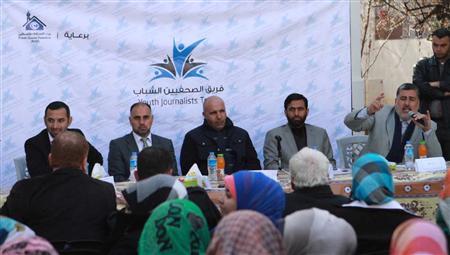
.JPG)
.JPG)
.JPG)
.JPG)
.JPG)
.JPG)

